No results found
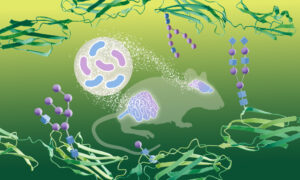
Bacteria, brains, and sugar: scientists uncover new connections
Scientists have discovered that gut bacteria can alter molecular signatures in the brain, using a brand new method to study how carbohydrates modify proteins.
SCIENCE & TECHNOLOGY2025
science-technology
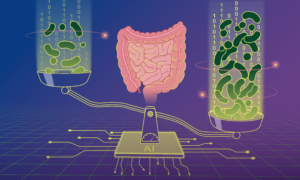
Microbial load can influence disease associations
Scientists have developed a new machine-learning model to predict microbial load — the density of microbes in our guts — and used it to demonstrate how microbial load plays an important role in disease-microbiome associations.
SCIENCE & TECHNOLOGY2024
science-technology
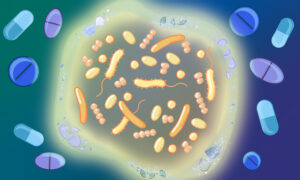
Better together: gut microbiome communities’ resilience to drugs
EMBL Heidelberg researchers compared the effect of drugs on isolated bacteria versus those growing in communities. This is the first study showing that bacteria are more resilient when in community due to cross-protection strategies. This could help researchers design more efficient therapies.
SCIENCE & TECHNOLOGY2024
science-technology
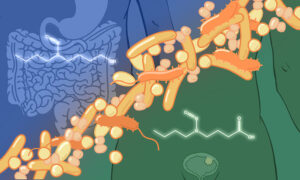
Gut microbes implicated in bladder cancer
Study shows that gut bacteria can metabolise carcinogens and cause them to accumulate in distant organs, leading to tumour development.
SCIENCE & TECHNOLOGY2024
science-technology
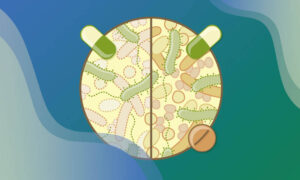
Exploring microbial life in context
EMBL researchers and their partners have been studying microbial functions and interactions for the benefit of human and planetary health for the last two decades.
SCIENCE & TECHNOLOGY2024
science-technology
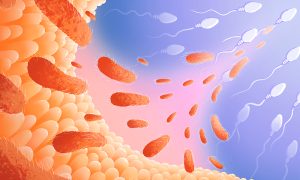
Father’s gut microbes affect the next generation
Scientists from EMBL Rome and EMBL Heidelberg found that disrupting the gut microbiome of male mice increases the risk of disease in their offspring. Their findings suggest that a father’s pre-conception environment can have lifelong effects on offspring.
SCIENCE & TECHNOLOGY2024
science-technology

MGnify Genomes mouse gut catalogue v1.0 released
The MGnify data resource for microbiome data has launched the latest MGnify Genomes catalogue comprising 112,951 genomes derived from mouse gut datasets, represented by 2,847 species-level cluster representative genomes. This catalogue was generated as part of our work with the MRC funded…
2024
updates-from-data-resources

EMBL scientists receive prestigious ERC Synergy Grants
Jan Kosinski, Julia Mahamid, and Georg Zeller have received grants to enable ambitious projects aimed at mapping the cellular protein synthesis machinery in context and understanding complex host-microbiome interactions, respectively.
EMBL ANNOUNCEMENTS2023
embl-announcementsscience
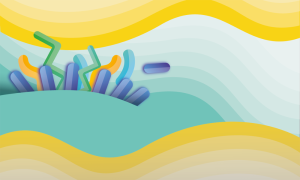
Six symposium takeaways about human microbiome research
Here are six takeaways from a recent EMBO/EMBL symposium that brought together scientists to discuss the state of research involving the human microbiome and its connection to health and disease.
SCIENCE & TECHNOLOGY2023
eventsscience-technology

ERC starting grants for two EMBL Heidelberg researchers
Jordi van Gestel and Maria Zimmermann-Kogadeeva each receive 1.5 million EUR funding for research projects on microbial predators and the gut microbiome respectively
EMBL ANNOUNCEMENTSLAB MATTERS2023
embl-announcementslab-matters

Open data to power up the blue economy
EMBL-EBI Senior Scientist Rob Finn explains why data coordination and sharing are fundamental for a sustainable blue economy.
PEOPLE & PERSPECTIVES2023
people-perspectivesperspectivesscience
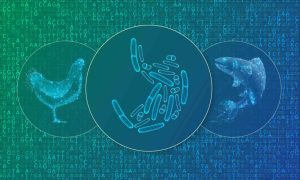
Supporting the development of hologenomic approaches for more sustainable animal feeds
HoloFood, the first consistent collection of multiomic data about chicken and salmon gut microbiomes, set to enable the development of better animal feeds.
SCIENCE & TECHNOLOGY2023
sciencescience-technologytechnology-and-innovation

EMBL alumni: Alex Almeida on the unchartered gut microbiome and becoming a principal investigator
As a postdoc Alex Almeida used bioinformatics to push the boundaries of what we know about the gut microbiome. Here, Almeida explains how his time at EMBL-EBI generated new research avenues, and how the skills and connections from his postdoc prepared him for leading his own research group at the…
PEOPLE & PERSPECTIVES2023
people-perspectivesperspectives
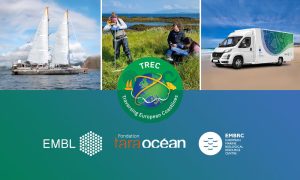
TREC: A two-year mission to study human impact on Europe’s seas and coastal regions
EMBL is leading the TREC project: the first pan-European and cross-disciplinary effort to examine life in its natural context.
EMBL ANNOUNCEMENTSLAB MATTERS2023
embl-announcementslab-matters

BlueRemediomics: harnessing marine microbes to promote a circular bioeconomy
Funding awarded for developing tools to harness marine microbiome data for biotechnological applications and ecosystem services.
2023
announcementsscience

Molecules to Ecosystems: Rob Finn on the Microbial Ecosystems transversal theme
Rob Finn, one of the co-chairs of the Microbial Ecosystems theme, discusses his work, the challenges of multidisciplinary research, and how the theme is already helping to promote the exchange of scientific ideas.
LAB MATTERSPEOPLE & PERSPECTIVES2023
lab-matterspeople-perspectives
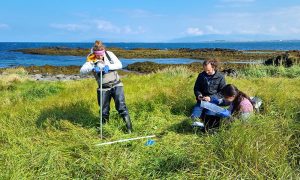
Examining life along Iceland’s coasts
The final pilot project in Iceland marked the countdown to the ‘Traversing European Coastlines’ (TREC) expedition to study coastal ecosystems and their response to changes in the environment.
LAB MATTERSSCIENCE & TECHNOLOGY2022
lab-mattersscience-technology

When microbiomes collide
EMBL researchers used data from over 300 human faecal microbiota transplants to gain an ecological understanding of what happens when two gut microbiomes clash.
SCIENCE & TECHNOLOGY2022
sciencescience-technology
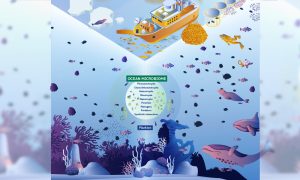
Priorities for ocean microbiome research
Microbial communities play essential roles in ocean ecology and planetary health. A recent publication highlights priorities for understanding and protecting ocean microbiomes.
SCIENCE & TECHNOLOGY2022
sciencescience-technology
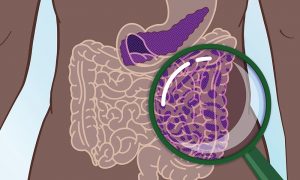
An international study proposes stool analysis for early detection of pancreatic cancer
A molecular signature of 27 microorganisms in stool defines the high-risk population for the most common pancreatic cancer and could be used for early detection of the disease.
SCIENCE & TECHNOLOGY2022
sciencescience-technology
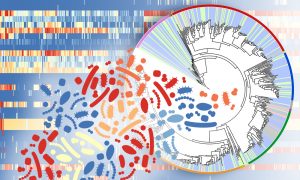
New bacteria and viruses found on human skin
Researchers have identified hundreds of new bacterial species and viruses in the human skin microbiome.
SCIENCE & TECHNOLOGY2022
sciencescience-technology

EMBL and Gulbenkian strengthen their scientific collaboration
The agreement focuses on reinforcing the collaboration between scientists to strengthen our understanding of the organism in its environment.
CONNECTIONSLAB MATTERS2021
connectionslab-matters
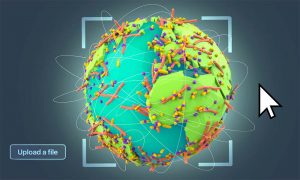
Connecting the dots between bacterial genes around the world
Bork Group at EMBL Heidelberg analysed a new global gene database to study how genes emerge and spread across various habitats on our planet. In the future, the group will expand the database and use it for studying microbial gene evolution and dispersal at a finer-grained scale.
SCIENCE & TECHNOLOGY2021
sciencescience-technology
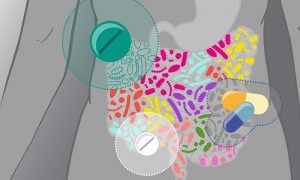
The impact of drugs on gut microbes is greater than we thought
Researchers studying a massive cohort of European patients have found that commonly prescribed drugs for cardiometabolic disorders can have long-term effects on the gut microbiome. Such effects can complicate the understanding of how disease affects the microbiome and must be taken into…
SCIENCE & TECHNOLOGY2021
sciencescience-technology

Welcome: Maria Zimmermann-Kogadeeva
Maria Zimmermann-Kogadeeva is one of EMBL’s newest group leaders and a computational biologist whose research group applies computational modelling to better understand the metabolism of gut bacteria and their potential to have far-reaching impacts on other organs.
LAB MATTERSPEOPLE & PERSPECTIVES2021
lab-matterspeople-perspectives
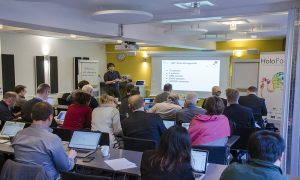
Harnessing the microbiome to improve meat production
International project uses biomolecular data to improve animal feed and make meat production more sustainable
SCIENCE & TECHNOLOGY2021
sciencescience-technology

Novel enzymes for a Green Economy
Using metagenomic data to find novel enzymes for plastic degradation and beyond
SCIENCE & TECHNOLOGY2021
sciencescience-technology
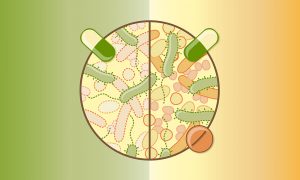
Tackling the collateral damage from antibiotics
Researchers from EMBL’s Typas group and collaborators have analysed the effects of 144 antibiotics on the wellbeing of gut microbes. The study improves our understanding of antibiotics’ side effects and suggests a new approach to mitigating the adverse effects of antibiotics therapy on gut…
SCIENCE & TECHNOLOGY2021
sciencescience-technology

Transferable skills
In the lab, Diënty Hazenbrink works with microbes that live in our guts. In her free time, she enjoys wildlife photography. A shared set of skills facilitates both activities.
LAB MATTERSPEOPLE & PERSPECTIVES2021
lab-matterspeople-perspectives

EMBL and Helmholtz Health join forces
EMBL and Helmholtz Association have signed a memorandum of understanding. The expanded collaboration of both institutions will focus on research related to health.
CONNECTIONSLAB MATTERS2021
connectionslab-matters
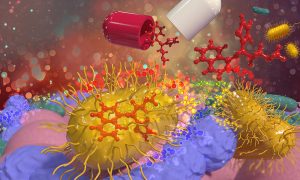
Common medications accumulate in gut bacteria
A new collaborative study led by EMBL group leaders Kiran Patil, Nassos Typas, and Peer Bork has found that common medications accumulate in human gut bacteria. This process reduces drug effectiveness and affects the metabolism of common gut microbes, thereby altering the gut microbiome.
SCIENCE & TECHNOLOGY2021
sciencescience-technology

How our gut microbiome changes over time
Researchers investigate how external factors can influence the persistence of microbe species in the human gut
SCIENCE & TECHNOLOGY2021
sciencescience-technology
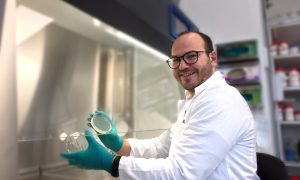
Michael Zimmermann receives FEBS Anniversary Prize
The Gesellschaft für Biochemie und Molekularbiologie has awarded a FEBS Anniversary Prize to Michael Zimmermann for his gut microbiome research.
EMBL ANNOUNCEMENTSLAB MATTERS2021
embl-announcementslab-matters
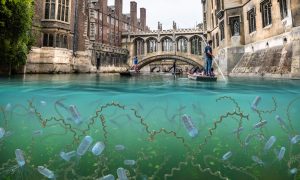
Monitoring dangerous bacteria in freshwater
Freshwater sports can cause waterborne infections, but real-time DNA sequencing could help.
SCIENCE & TECHNOLOGY2021
sciencescience-technology
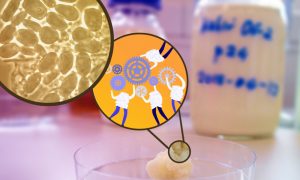
In kefir, microbial teamwork makes the dream work
Researchers discovered the dominant species of bacteria in kefir grains cannot endure without other species that help the 'team' survive.
SCIENCE & TECHNOLOGY2021
sciencescience-technology
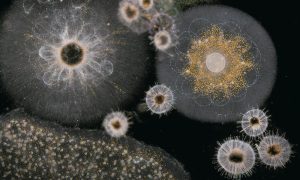
Microbiomes help predict the future of the Atlantic
Microbiomes, plastics, and connectivity – AtlantECO aims to understand the fabric of the Atlantic Ocean.
CONNECTIONS2020
connectionsscience
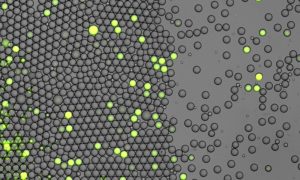
An ocean of droplets
Bacterial cells are embedded in microfluidic droplets in oil. The fluorescence indicates the presence of the targeted DNA strain with the help of a characteristic DNA sequence.
SCIENCE & TECHNOLOGY2020
picture-of-the-weekscience-technology
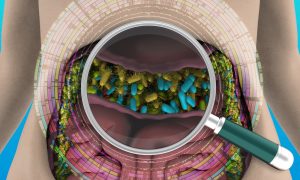
Unparalleled inventory of the human gut ecosystem
An international team of scientists has collated all known bacterial genomes from the human gut microbiome into a single large database. Their work will allow researchers to explore the links between bacterial genes and proteins, and their effects on human health.
SCIENCE & TECHNOLOGY2020
sciencescience-technology
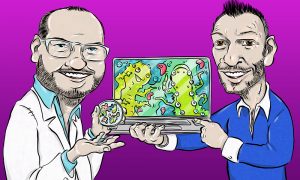
Applications for virtual learning lab open
The European Learning Laboratory for the Life Sciences (ELLS), EMBL’s education facility, invites secondary school science teachers to participate in a virtual training course this autumn entitled ‘Introducing your microbiome’.
LAB MATTERS2020
lab-matters
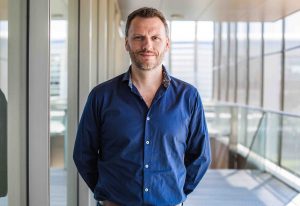
Microbiomes take the stage at New Scientist Live
On microbiomes, public engagement and not being boring
PEOPLE & PERSPECTIVES2019
eventspeople-perspectives

Welcome: Michael Zimmermann
Michael Zimmermann's group will investigate how gut microbes affect the body’s response to drugs.
PEOPLE & PERSPECTIVES2019
people-perspectivesscience

Global microbial signatures for colorectal cancer
Colorectal cancer characterised by consistent changes in gut bacteria across continents, cultures and diets
SCIENCE & TECHNOLOGY2019
sciencescience-technology
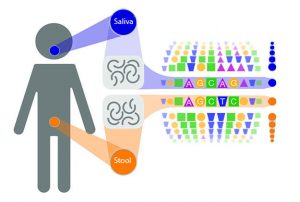
Many gut microbes may originate in the mouth
Many microbes traverse the oral-gut barrier
SCIENCE & TECHNOLOGY2019
sciencescience-technology
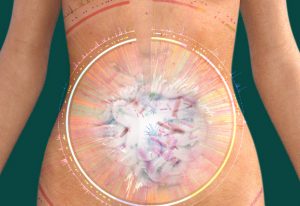
Almost 2000 unknown gut bacteria discovered
Researchers identify novel gut bacteria species and call for more data from beyond Europe and North America
SCIENCE & TECHNOLOGY2019
sciencescience-technology
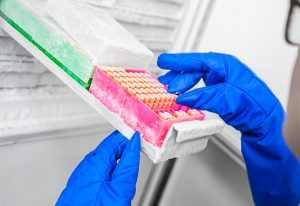
More than 100 new gut bacteria discovered in human microbiome
A new database of bacteria in the human microbiome is the most comprehensive to date.
SCIENCE & TECHNOLOGY2019
sciencescience-technology

Ambition and talent
Nina Kathe, Winner of the EU Contest for Young Scientists visits EMBL
LAB MATTERS2018
eventslab-matters
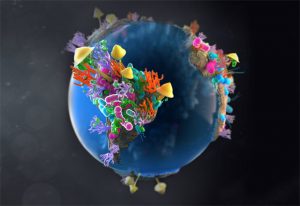
Understanding soil through its microbiome
First global survey of soil genomics reveals a war between fungi and bacteria
SCIENCE & TECHNOLOGY2018
sciencescience-technology

Dog microbiome closer to humans’ than expected
Dog and human gut microbiomes have more similar genes and responses to diet than previously thought
PEOPLE & PERSPECTIVES2018
people-perspectivesscience
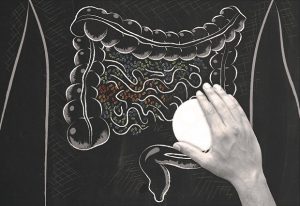
Commonly used drugs affect our gut bacteria
One in four drugs with human targets inhibit the growth of bacteria in the human gut, and may promote antibiotic resistance, EMBL researchers report in Nature
SCIENCE & TECHNOLOGY2018
sciencescience-technology
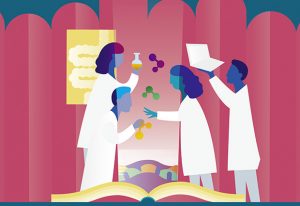
Molecular cuisine for gut bacteria
EMBL scientists show how to grow a wide range of gut bacteria in the lab
SCIENCE & TECHNOLOGY2018
sciencescience-technology
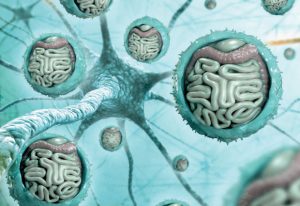
How bacteria affect your wellbeing
Science and Society event answers controversial questions about gut microbes
SCIENCE & TECHNOLOGY2017
eventsscience-technology

Welcome: Georg Zeller
Team leader investigates how the gut microbiome could relate to human diseases
SCIENCE & TECHNOLOGY2016
sciencescience-technology
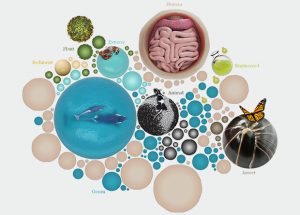
Microbiomes: Our humble overlords
What's a microbiome? How on Earth do they work?
SCIENCE & TECHNOLOGY2016
sciencescience-technology
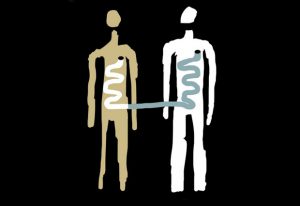
Poo transplants better understood
Stool transplants: finding the right match important, EMBL study shows
SCIENCE & TECHNOLOGY2016
sciencescience-technology
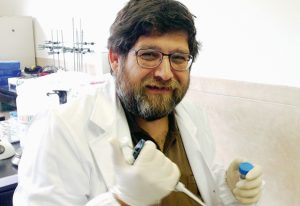
Stick out your tongue!
Alumnus Luis Bejarano asked Spanish students to stick out their tongues to analyse their microbiome.
PEOPLE & PERSPECTIVES2015
alumnipeople-perspectives
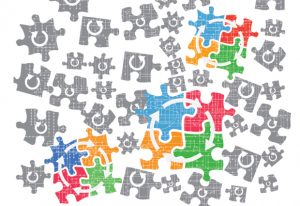
When microbes feed each other
Cooperate or compete? Microbes show us that getting along is the better choice for communities.
SCIENCE & TECHNOLOGY2015
sciencescience-technology
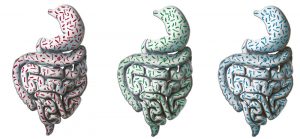
What’s your gut type?
In the future, when you walk into a doctor’s surgery or hospital, you could be asked not just about your allergies and blood group, but also about your gut type. Scientists at the European Molecular Biology Laboratory (EMBL) in Heidelberg, Germany, and collaborators in the international MetaHIT…
SCIENCE & TECHNOLOGY2011
sciencescience-technology
Bacterial balance that keeps us healthy
The thousands of bacteria, fungi and other microbes that live in our gut are essential contributors to our good health. They break down toxins, manufacture some vitamins and essential amino acids, and form a barrier against invaders. A study published today in Nature shows that, at 3.3 million,…
SCIENCE & TECHNOLOGY2010
sciencescience-technology
Researchers establish international human microbiome consortium
Today at a meeting organised by the European Molecular Biology Laboratory (EMBL) in Heidelberg, Germany, scientists from around the globe announced the formation of the International Human Microbiome Consortium (IHMC), an effort that will enable researchers to characterise the relationship of the…
LAB MATTERS2008
lab-matters
Researchers identify molecular basis of inflammatory bowel disease
Inflammatory bowel diseases, such as Crohn’s disease and Ulcerative Colitis, severely impair the lives of more than four million people worldwide. The development of effective therapies against these diseases requires an understanding of their underlying molecular mechanisms. Researchers from…
SCIENCE & TECHNOLOGY2007
sciencescience-technology
Investigating the invisible life in our environment
Microorganisms make up more than a third of the Earth’s biomass. They are found in water, on land and even in our bodies, recycling nutrients, influencing the planet’s climate or causing diseases. Still, we know surprisingly little about the smallest beings that colonise Earth. A new…
SCIENCE & TECHNOLOGY2007
sciencescience-technology